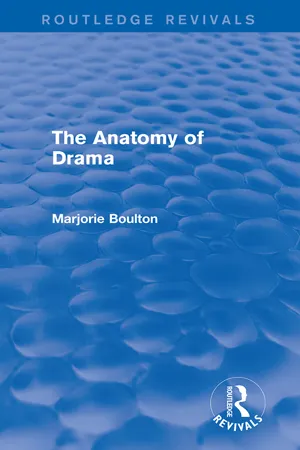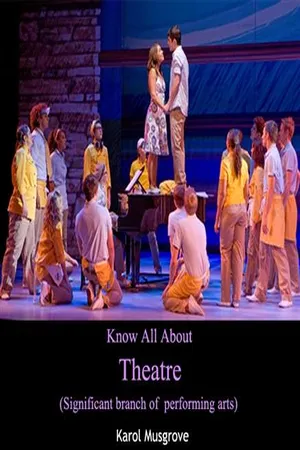Literature
Comedy in Drama
Comedy in drama refers to the use of humor and lighthearted elements in a dramatic work to entertain and provoke laughter in the audience. It often involves amusing characters, witty dialogue, and humorous situations that provide a contrast to the serious themes or conflicts within the story. Comedy in drama serves to provide comic relief and offer a different perspective on the human experience.
Written by Perlego with AI-assistance
Related key terms
1 of 5
4 Key excerpts on "Comedy in Drama"
- eBook - PDF
- Victor Raskin(Author)
- 2008(Publication Date)
- De Gruyter Mouton(Publisher)
Humor in literature 525 with the classical meaning of “comedy” as a story about the powerless vs� the powerful, or the little man vs� the big man, or even about the perils and pitfalls of social pretence� Thus Dante named his magnum opus “The Divine Comedy” even though it is not in all parts (most notably the Paradiso, but also most of the Purgatorio and some of the Inferno) at all funny� Greek comedies, from the language of which the word is derived, were often bawdy or ribald and ended happily for everyone� To Chaucer, Shakespeare, and other writers of the Middle Ages and Renaissance a comedy was a story (but especially a play, as to the Greeks) with a happy ending, whether humorous or not� Throughout this chapter, the term “comedy” and its derivatives will be used in the classical rather than the common sense� The comedy was developed as a stage play by the ancient Greeks and is generally divided into three major phases, the Old Comedy of the sixth and fifth centuries bce, which often makes fun of a specific person and of current political issues, the Middle Comedy of the fifth and four centuries bce, which makes fun of more general themes such as literature, professions, and society, and the New Comedy of the fourth and third centuries bce which typically revolves around the bawdy adventures of a blustering soldier, a young man in love with an unsuitable woman, or a father figure who cannot follow his own advice� Of the Old and Middle comedies, the only that have survived com-plete are eleven plays of Aristophanes’� The Clouds (of which only a revised version survives) lampoons Socrates in heaven, in the Old tradition, while Lysistrata makes fun of human nature in general, and Plutus personifies both wealth and poverty in Athens, who so distract the citizenry that they neglect the gods, and is considered to be a Middle comedy� The author of New comedy whose work - eBook - PDF
- Robert Maslen(Author)
- 2014(Publication Date)
- The Arden Shakespeare(Publisher)
My purpose is to show how far Shakespearean comedy was a product of its cultural climate, and to provide vital refer-ence points for the discussion that follows. I hope too to evoke the mood in which that discussion ought to be conducted: a mood where the comic can be serious, unsettling, even horrifying, without losing an iota of its ebullience, wit or (occasionally) charm. Needless to say, I have a good deal less confidence in my own ability to evoke that mood than in the fact that Shakespeare breathed it in along with the pungent air of Elizabethan London. THE TROUBLED HISTORY OF COMEDY For the Elizabethans the history of comedy in the theatre was insepar-able from that of class conflict. Comedy was the dramatic form that dealt with commoners – all those below the level of the aristocracy – ‘never medling with any Princes matters nor such high personages, but commonly of marchants, souldiers, artificers, good honest housholders, and also of unthrifty youthes, yong damsels, old nurses, bawds, brokers, ruffians and parasites’, as the courtier-critic George Puttenham put it in 15 8 9. 7 The genre concerned itself, in fact, with the social stratum occupied by the actors themselves, giving it a voice and placing it at the centre of the action at a time when it had few opportunities to articu-late its concerns at the highest level of political life. I N T RO D U C T I O N 5 No wonder, then, that the Elizabethans saw comedy as having been subject to the suspicion of rulers from ancient times to the present. Tragedy made tyrants weep and change their ways: Sir Philip Sidney tells the story of the murderous dictator Alexander Pheraeus, whose willingness to ‘make matters for tragedies’ did not prevent him from weeping at a tragedy on stage. 8 Comedy, on the other hand, made tyrants uncomfortable and roused them to rage. - eBook - ePub
- Marjorie Boulton(Author)
- 2014(Publication Date)
- Routledge(Publisher)
Whereas in tragedy we see people suffering because of their characters, in comedy we see them make fools of themselves because of their reactions to the comic situations; destiny in comedy brings out the humorous side of character. The treatment of character in comedy may range from the cynical and almost contemptuous, as in Jonson's The Silent Woman or Somerset Maugham's The Breadwinner, to the kindly and affectionate treatment of human fallibility as in As You Like It, Noel Coward's The Young Idea and Christopher Fry's Venus Observed. Sometimes in the comedy of character it is only the principal character who is really comic; for instance, in Molière's L ’ Avare only the miser Harpagon is really comic; the other characters, especially the young lovers, give the impression of being quite reasonable beings. Or, as in Jonson's comedies, all the characters may be comic. A good comedy of errors such as She Stoops to Conquer also has a strong character-interest. 10. Farce Farce is to comedy roughly what melodrama is to tragedy—it aims at producing laughter by exaggerated effects of various kinds and is without psychological depth. Characterization and wit are less important than a rapid succession of amusing situations. The comic situations are generally rather crude; farce has been called ‘custard-pie comedy’ because it often uses such purely material absurdities as people throwing custard pies or other messy things at each other's heads, heavy falls or instances of the perversity of inanimate objects. Surprises, coincidences and exaggerations abound. Probability is not much regarded. The form is on a relatively low artistic level, but good farce, like good melodrama, may show a high standard of craftsmanship in the writing, and it demands a high standard of slick production, especially in timing. Good farce is usually nearer to the comedy of errors than to the other kinds of comedy - No longer available |Learn more
- (Author)
- 2014(Publication Date)
- The English Press(Publisher)
Considered as a genre of poetry in general, the dramatic mode has been contrasted with the epic and the lyrical modes ever since Aristotle's Poetics (c. 335 BCE)—the earliest work of dramatic theory. The use of drama in the narrow sense to designate a specific type of play dates from the 19th century. Drama in this sense refers to a play that is neither a comedy nor a tragedy— for example, Zola's Thérèse Raquin (1873) or Chekhov's Ivanov (1887). It is this narrow sense that the film and television industry and film studies adopted to describe drama as a genre within their respective media. Radio drama has been used in both senses — originally transmitted in a live performance, it has also been used to describe the more high-brow and serious end of the dramatic output of radio. Drama is often combined with music and dance: the drama in opera is sung throughout; musicals include spoken dialogue and songs; and some forms of drama have regular musical accompaniment (melodrama and Japanese Nō, for example). In certain periods of history (the ancient Roman and modern Romantic) dramas have been written to be read rather than performed. In improvisation, the drama does not pre-exist the moment of performance; performers devise a dramatic script spontaneously before an audience. History of Western drama Classical Athenian drama Western drama originates in classical Greece. The theatrical culture of the city-state of Athens produced three genres of drama: tragedy, comedy, and the satyr play. Their origins remain obscure, though by the 5th century BCE they were institutionalised in competitions held as part of festivities celebrating the god Dionysus.
Index pages curate the most relevant extracts from our library of academic textbooks. They’ve been created using an in-house natural language model (NLM), each adding context and meaning to key research topics.



